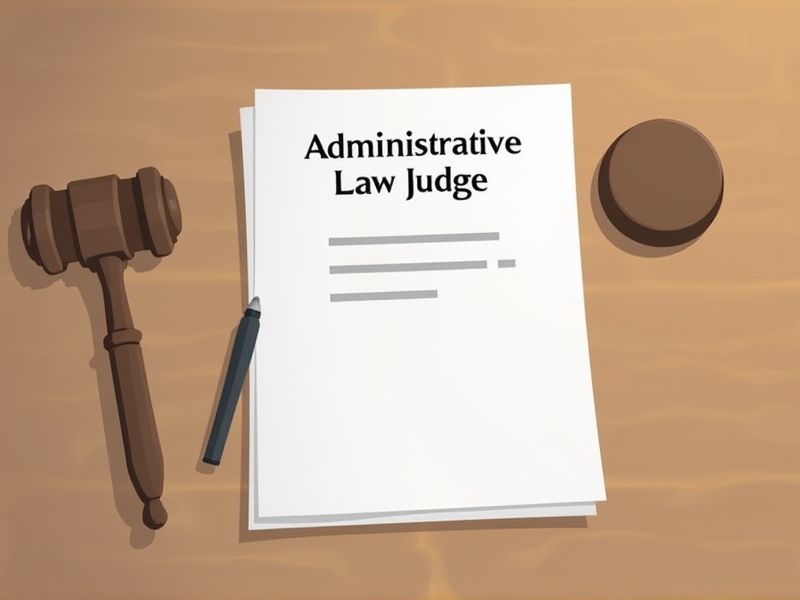
An Administrative Law Judge (ALJ) primarily interprets and applies laws, so having specialized certifications ensures they possess the necessary legal expertise. These certifications validate their understanding of complex legal frameworks and procedural protocols. They also enhance the judge's credibility and ability to render unbiased decisions. Here are some important certifications you may need for an Administrative Law Judge.
Certified Administrative Law Judge (CALJ)
A Certified Administrative Law Judge (CALJ) is essential because they undergo rigorous training that ensures they have expert knowledge in administrative procedures and legal frameworks. This expertise allows them to make informed and impartial decisions in complex administrative cases, maintaining trust and credibility within the legal system. By having a CALJ overseeing Administrative Law Judges, consistency and compliance with legal standards across cases are reinforced. Their role also aids in reducing case backlog, providing timely resolutions that benefit both the public and governmental bodies.
Advanced Administrative Law Certification (AALC)
Obtaining an Advanced Administrative Law Certification (AALC) enhances an Administrative Law Judge's credibility by demonstrating a deeper understanding of complex legal frameworks. Certification often results in improved consistency and fairness in adjudicating cases due to the rigorous training involved. As legal landscapes become multifaceted, specialized knowledge fosters efficient decision-making. Competitive job market trends show that certified professionals may have an edge in securing advanced roles.
Federal Administrative Law Judge Certification
Federal Administrative Law Judge (ALJ) Certification ensures that candidates meet specific qualifications, including legal experience and specialized training, necessary for fair decision-making. Certification establishes uniform standards, which promote consistency in adjudicatory processes across federal agencies. It enhances public trust by verifying that judges possess impartiality and competence in handling complex legal issues. The certification process safeguards the integrity of administrative hearings and decisions, impacting governance and compliance with federal regulations.
Alternative Dispute Resolution (ADR) Certification
Training in ADR equips Administrative Law Judges with skills in mediation and arbitration, leading to more efficient case resolutions. The certification provides judges with structured methods to handle disputes, minimizing court backlog. As ADR encourages collaborative solutions, it reduces recidivism in contested administrative issues. Formalized training ensures consistency and fairness, reinforcing public confidence in administrative legal proceedings.
Mediation and Arbitration Certification
Acquiring Mediation and Arbitration Certification enhances an administrative law judge's skills in conflict resolution, aligning with the demands of contemporary legal systems that prioritize alternative dispute resolution methods. This certification can lead to more efficient case resolutions, reducing court backlog and saving public resources. It also instills confidence in the parties involved, as they perceive the judge as equipped to handle disputes fairly and efficiently. The certification can further elevate the judge's career prospects, as many agencies now seek judges who are proficient in mediation and arbitration.
Legal Research and Writing Certification
Legal Research and Writing Certification equips an Administrative Law Judge with the precision necessary to interpret complex legal texts accurately. This skill fosters effective drafting of decisions and opinions, impacting the outcomes of legal proceedings. Certification reinforces proficiency in identifying relevant case laws and statutes, vital for making informed judgments. Enhanced research and writing capabilities ensure that case documentation aligns with legal standards, safeguarding against procedural errors.
Ethics in Government Certification
Ethics in Government Certification helps ensure that Administrative Law Judges adhere to high ethical standards, which fosters public trust. This certification process mitigates conflicts of interest, enhancing objectivity in their decision-making. It also promotes fairness and transparency, ensuring that all legal proceedings are equitable. Strengthened accountability through certification can reduce corruption and uphold the integrity of the judicial system.
Public Administration Professional Certification
Obtaining a Public Administration Professional Certification equips an Administrative Law Judge with a comprehensive understanding of public sector dynamics, enhancing decision-making capabilities in legal contexts. Certification fosters competencies in ethical governance and public service principles, crucial for fair and impartial adjudication. Exposure to current public administration practices through such certification aids judges in applying relevant regulations more effectively. Mastery of administrative principles ensures judges can handle complex cases with informed perspectives.
Regulatory Compliance Certification
Regulatory compliance certification is crucial for an Administrative Law Judge to ensure they possess up-to-date knowledge of legal standards and regulations. This certification helps maintain the integrity of judicial proceedings by ensuring decisions align with current laws. It enhances public trust, as certified judges are perceived as more credible and competent. Proper certification reduces the likelihood of legal challenges and appeals, leading to more efficient case resolution.
Continuing Legal Education (CLE) Certificate in Administrative Law
A CLE Certificate in Administrative Law ensures an Administrative Law Judge stays current with evolving regulations and case law. The complexities of administrative procedures necessitate ongoing education to interpret and apply rules accurately. Maintaining expertise in this field enhances fair and consistent decision-making processes. Furthermore, a CLE Certificate supports professional credibility and trust in the judgment rendered by the judge.
Summary
When an Administrative Law Judge obtains certifications, you can expect a heightened level of trust and confidence in their expertise. Certifications typically lead to enhanced decision-making and procedural accuracy in legal proceedings. The judges often gain specialized knowledge that directly benefits complex case handling. In turn, overall efficiency and public confidence in the administrative legal system generally improve.
